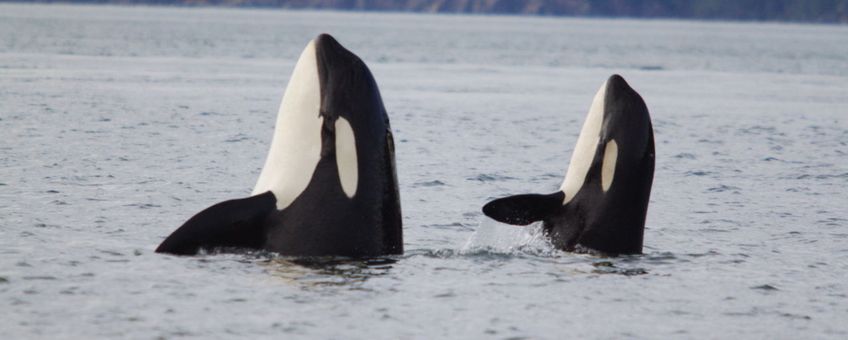
Killer whales: Reproduce or die?
CRABKiller whales show the longest post-reproductive lifespan of all non-human animals. Females generally stop reproducing in their 30’s to 40’s, but can live up to 90. Yet, current explanations were still falling short of completely explaining the timing of menopause in killer whales. Naturally, grandmothers benefit when, due to their help, their adult children and grandchildren have more chance of survival. But these benefits did not balance the costs of completely ceasing reproduction. By using a unique 43-year-long dataset of wild resident killer whales, collected by the Center for Whale Research and Fisheries and Oceans Canada, the researchers now show that intergenerational conflict (conflict between mother and daughter) is another essential factor explaining the existence and timing of menopause.
Quite uniquely, both male and female killer whales stay within the social group in which they are born and mating occurs with mates from other social groups. As a consequence, the older a sexually active female killer whale gets, the more related she will become to the other individuals in her group. To keep reproducing she will need to compete with her own family to get enough resources. For example, to support lactation, a female needs approximately 42% more food. Food sharing is a very important component of the social lives of resident killer whales and acting competitively (selfish) is thus likely to negatively impact other group (family) members. Because younger females are less related to other group members they are expected to act more selfishly compared to older females.
By analysing the long-term killer whale dataset, the researcher found that when a conflict between mother and daughter was present, the calves of older generation mothers were 1.7 times more likely to die compared to the calves of younger mothers. As age did not directly influence this mortality effect, it is very likely that the difference in competitive effort between mother and daughter was an important factor explaining the higher calf mortality.
 Older females are known to help their adult offspring by transferring knowledge of when and where to find food and by boosting their sons’ mating success. These benefits in combination with the costs of higher calf mortality, now explains the exceptionally early menopause in killer whales. It pays more, and costs less, to stop reproducing yourself and help your adult offspring.
Older females are known to help their adult offspring by transferring knowledge of when and where to find food and by boosting their sons’ mating success. These benefits in combination with the costs of higher calf mortality, now explains the exceptionally early menopause in killer whales. It pays more, and costs less, to stop reproducing yourself and help your adult offspring.
“Our previous work shows how old females help but not why they stop reproducing,” said Professor Darren Croft. “Females of many species act as leaders in late life but continue to reproduce, but this new research shows that old females go through the menopause because they lose out in reproductive competition with their own daughters.”
The study is published open access in the scientific journal Current Biology.
Text: Darren Croft, Centre for Research in Animal Behaviour; Lysanne Snijders, Nature Today
Photos: Emma Foster; Kenneth Balcomb, Center for Whale Research

